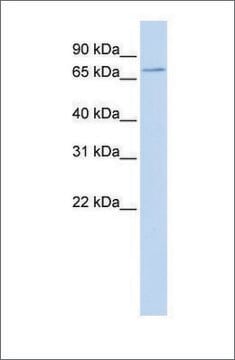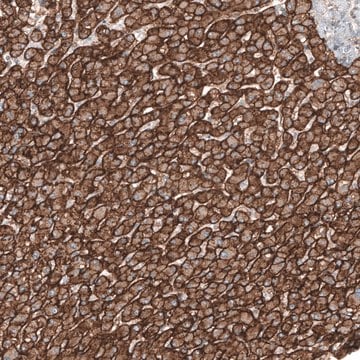ABC1453
Anti-Sodium-Iodine Symporter (NIS) C-term
from rabbit
Synonym(s):
Sodium/iodide cotransporter, Na(+)/I(-) cotransporter, NIS, Sodium-iodide symporter, Na(+)/I(-) symporter, Solute carrier family 5 member 5
About This Item
Recommended Products
biological source
rabbit
Quality Level
antibody form
affinity isolated antibody
antibody product type
primary antibodies
clone
polyclonal
species reactivity
rat, mouse
technique(s)
immunocytochemistry: suitable
immunohistochemistry: suitable
immunoprecipitation (IP): suitable
western blot: suitable
isotype
IgG
NCBI accession no.
UniProt accession no.
shipped in
ambient
target post-translational modification
unmodified
Gene Information
rat ... Slc5A5(114613)
Related Categories
General description
Specificity
Immunogen
Application
Apoptosis & Cancer
Immunocytochemistry Analysis: A representative lot detected Sodium-Iodine Symporter (NIS) C-term in Immunocytochemistry applications (Levy, O., et. al. (1997). Proc Natl Acad Sci USA. 94(11):5568-73; De La Vieja, A., et. al. (2004). J Cell Sci. 117(Pt 5):677-87).
Immunohistochemistry Analysis: A representative lot detected Sodium-Iodine Symporter (NIS) C-term in rat thyroid, mammary gland from lactating rat (Tazebay, U.H., et. al. (2000). Nat Med. 6(8):871-8).
Western Blotting Analysis: A representative lot detected Sodium-Iodine Symporter (NIS) C-term in Western Blotting applications (Levy, O., et. al. (1997). Proc Natl Acad Sci USA. 94(11):5568-73; Tazebay, U.H., et. al. (2000). Nat Med. 6(8):871-8; Levy, O., et. al. (1998). J Biol Chem. 273(35):22657-63; De La Vieja, A., et. al. (2004). J Cell Sci. 117(Pt 5):677-87).
Immunoprecipitation Analysis: A representative lot detected Sodium-Iodine Symporter (NIS) C-term in Immunoprecipitation applications (De La Vieja, A., et. al. (2004). J Cell Sci. 117(Pt 5):677-87; Levy, O., et. al. (1998). J Biol Chem. 273(35):22657-63).
Quality
Western Blotting Analysis: 1.5 µg/mL of this antibody detected Sodium-Iodine Symporter (NIS) C-term in 10 µg of rat thyroid tissue lysate.
Target description
Physical form
Storage and Stability
Other Notes
Disclaimer
Not finding the right product?
Try our Product Selector Tool.
Storage Class Code
12 - Non Combustible Liquids
WGK
WGK 1
Flash Point(F)
Not applicable
Flash Point(C)
Not applicable
Certificates of Analysis (COA)
Search for Certificates of Analysis (COA) by entering the products Lot/Batch Number. Lot and Batch Numbers can be found on a product’s label following the words ‘Lot’ or ‘Batch’.
Already Own This Product?
Find documentation for the products that you have recently purchased in the Document Library.
Our team of scientists has experience in all areas of research including Life Science, Material Science, Chemical Synthesis, Chromatography, Analytical and many others.
Contact Technical Service








